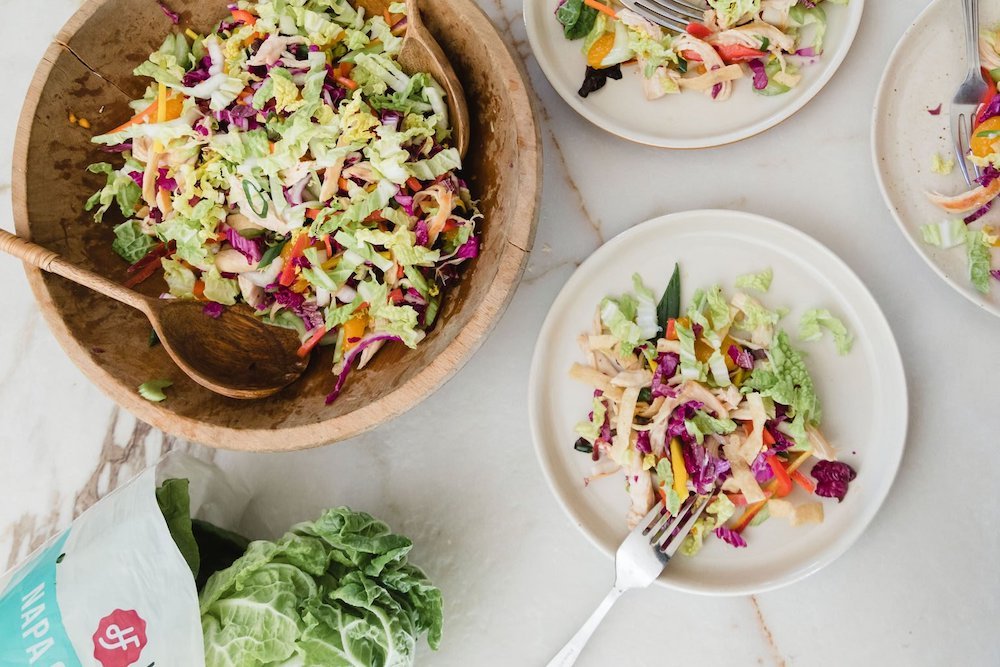Napa cabbage and green cabbage are categorized as cruciferous vegetables, so we expect them to be similar. Both leafy greens belong to the Brassicaceae family, so we can almost call them siblings.
While these favorite vegetables are similar in many ways, they do have their differences.
Let's enjoy an interesting serving of analysis that compares napa cabbage and regular cabbage. We'll leave room on the plate for new cabbage recipe ideas too.
What Are the Differences Between Napa and Regular Cabbage?
Cabbage History
Napa Cabbage – Napa cabbage is often called Chinese cabbage. It originated in China, migrating to Japan and Korea in the 14th century. Its name comes from the Japanese word "nappa," which means vegetable leaves.
Regular Cabbage – Basic green cabbage traces its roots back to the fourth century B.C. It originally grew wild in China, but the vegetable was eventually domesticated and later found its way to Europe.
Seasonal Availability
Napa Cabbage – While napa cabbage was once considered a cool-weather crop, it thrives in warm climates like California's rich Salinas Valley. Home chefs and foodservice professionals appreciate its year-round availability.
Regular Cabbage – This member of the Brassicaceae family is typically best from late fall to early spring. However, it grows well in our warmer states, and that keeps green cabbage available all year.
Nutritional Profile
Napa Cabbage – Vitamins B6, B9, C and K are just four of the many nutritious reasons to enjoy napa cabbage. The leafy green is also a flavorful source of calcium, iron, manganese, copper and important antioxidants.
Regular Cabbage – Raw green cabbage is an excellent source of vitamins C and K. It also serves up modest portions of folate and vitamin B6 as well as minerals, including manganese and potassium.
Shape and Appearance
Napa Cabbage – A large oblong head of napa cabbage can measure up to 12 inches from base to tip. Its ruffled leaves grow upward from the stem, wrapping the head in shades of light green and white.
Regular Cabbage – Regular cabbage heads are round with densely wrapped leaves. Their light green color becomes paler closer to the cabbage core. A large head usually weighs between 2 and 4 pounds.
Taste and Texture
Napa Cabbage – Slightly sweet and mild best describe the taste of fresh napa cabbage. Its leaves serve up a satisfying crunch that becomes more delicate near the cabbage heart. Napa's flavor and texture complement all types of cuisines, especially Asian entrees like classic kimchi.
Regular Cabbage – When it's cooked, the peppery, sweet taste of green cabbage becomes milder and takes on earthy overtones. The round heads yield firm leaves that hold up in slow-cooked dishes. That quality makes regular cabbage a must-have ingredient in simmered stews and baked casseroles.
Recipe Versatility
Napa Cabbage – Napa is a staple in Asian dishes, but the versatile leafy green goes well with a variety of contrasting flavors. It can be grilled, steamed, wrapped or fine-sliced into a crisp chiffonade. Napa cabbage stands on its own in salads. Its tender hearts stand out as edible serving bowls.
Regular Cabbage – Regular cabbage requires a longer cooking time to become tender, so it's a better choice for crock pot and stove-top meals. Corn beef and cabbage or stuffed cabbage rolls are delicious examples. Green cabbage is a favorite in slaws and sauerkrauts.
7 Cabbage Recipes You’ll Love
1. Citrusy Asian Napa Cabbage Salad
How do you toss an Asian and citrus fusion salad together in less than 30 minutes? It's easy with this recipe that melds the sharp-sweet flavors of blood orange and tangerine with a homemade miso vinaigrette.
A crispy bed of fresh napa cabbage holds it all together as a sensational side or enticing entree salad.
Serving Possibilities: Create a presentation-perfect effect by layering citrus slices with avocado wedges around the edge of the serving platter.
2. Purple Napa Champagne Salad
The bright taste of a champagne vinaigrette elevates this salad from simple to sophisticated.
The bright colors of purple napa cabbage and watermelon radish upgrade its beautiful presentation. Radicchio, honey crisp apple and watermelon radish complete the uniquely elegant salad.
Serving Possibilities: Play with the salad's color palette by switching out the sliced watermelon radish for slices of red or black radish.
3. Mayo-Free Cabbage Coleslaw
Try an alternative to traditional coleslaw by leaving the mayonnaise in the fridge. Instead, whip up a dressing with canola oil, soy sauce and red wine vinegar.
Garnish with green onions, almonds and sunflower seeds, and create a contemporary take on the classic green cabbage slaw.
Serving Possibilities: Adding a toss of shredded purple napa gives the slaw an enticing contrast of colors.
4. Crunchy Chicken and Napa Salad
Complement the natural crunch of napa cabbage with fried wonton strips in a salad that can easily serve as an entree. Thinly sliced chicken breast and Mandarin oranges round out the Asian-inspired dish.
Finish the plate with a drizzle of sesame and ginger vinaigrette, and enjoy compliments to the chef.
Serving Possibilities: Liven up the salad's color factor with red and purple carrot matchsticks.
5. Hearty Chicken and Cabbage Soup
Regular cabbage is a natural for enhancing the flavor of homemade chicken soup. The leafy vegetable adds body to a favorite comfort food that's best made from scratch.
Put sweet onions and Yukon gold potatoes on this soup's must-add ingredient list.
Serving Possibilities: Give guests the pleasure of taking a dip in the soup with thick slices of fresh ciabatta bread.
6. Savory Stir-Fried Pork and Napa Cabbage
Serve up a sensational entree in just 30 minutes with a savory stir-fry recipe.
Enjoy knowing it's a simple dish that's healthy, low-fat and very satisfying. Stir-fried pork and napa cabbage checks all the boxes, earning it a permanent place on home and restaurant menus.
Serving Possibilities: Add extra color and texture to the recipe with sliced carrots and red or green bell pepper strips.
7. Creole-Spiced Stuffed Cabbage
Classic cabbage rolls are even better when they're spiced with aromatic Creole seasonings. Mix homemade tomato sauce and rice with your choice of proteins, and then simply fold, roll and bake.
It's an easy way to kick up the basic dish and create a brand-new stuffed tradition.
Serving Possibilities: Top the cabbage rolls with a generous garnish of crisp smoky bacon or crunchy fried prosciutto.
Serving Our Very Best
Whether you're planning dinner or a delicious spring salad, it's great to have healthy choices. Fresh produce expands culinary possibilities at home and across the foodservice industry.
We're proud to be a part of it all, growing and shipping premium produce year-round.
We invite you to expand your recipe files with napa cabbage and napa cabbage hearts, fresh from our fields to your table. We also invite you to check back with us soon for more culinary inspiration.
Here at Hitchcock Farms, it's always a pleasure to serve you with our very best.
FAQ
Can regular cabbage be substituted for napa cabbage?
Both work well in salads and slaws, but it's not a good idea to substitute one for the other in cooked dishes. For example, napa's texture and flavor make it an ideal choice for quick stir-fries. Regular cabbage isn't as delicate as napa, so it's a better choice for slow-cooked recipes.
What is the healthiest type of cabbage?
Napa and regular cabbage are both low-fat, low-calorie and low-carb, but the nutritious profile of napa cabbage offers higher levels of vitamins C, K and folate than green cabbage. It also delivers higher levels of essential minerals.
Can I use any cabbage for kimchi?
Yes, but napa is best suited for this classic dish because of its texture and flavor. The tender leaves are ideal for brining, and the delicate taste melds with a variety of kimchi recipes. Other types of cabbage can overwhelm the flavor of kimchi ingredients.








